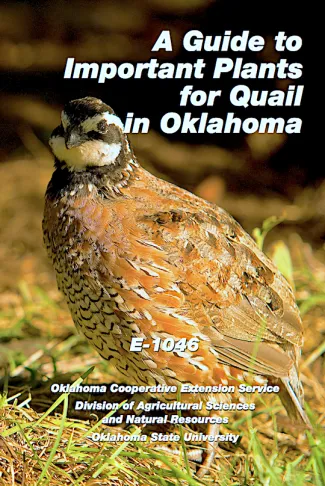Oklahoma’s diverse landscape – from the Panhandle all the way to the far southeastern corner – supports nearly 3,000 plant species. Many of these provide habitat for wildlife in the form of food or cover.
“But not all of those plants provide equal value as food or cover for wildlife,” said Kyle Johnson, Wildlife Department biologist and plant enthusiast. “Some non-native plants can be problematic and deter wildlife use altogether, especially for smaller species like quail and Texas horned lizards.”
Though challenging, successful plant identification can give insights to the wildlife value of the species, the community in which it occurs, and what, if any, management may be needed to optimize the habitat for target wildlife species.
“Unfortunately, the misidentification or misunderstanding of a plant can make it an unwanted weed,” said Johnson. “Species like common ragweed are sprayed or mowed each year, yet this is the single most important quail food across the entire state. On the flip side, non-native sericea lespedeza plants that go unnoticed can quickly take over many acres and reduce the value and usability of those acres for birds, pollinators, and other wildlife.”
One resource that can help build ID skills is “A Guide to Important Plants for Quail in Oklahoma” by the Oklahoma Cooperative Extension Service. Photographs and descriptions are provided for more than 50 native species along with notes on quail and insect use.

While the guide features plants beneficial to quail, a suite of other wildlife species may make use of the plants. Pair the guide with other resources to get a better understanding of our plant life and how it can impact our wildlife.
- Leaf through the “Field Guide to Oklahoma Plants” by Oklahoma State University and “The Guide to Oklahoma Wildflowers” by Patricia Folley
- Search the Plant Image Gallery from the Noble Research Institute and the Texas County Pasture and Roadside Plants Gallery from Kurt Schaefer
- Peruse neighboring state resources like Missouriplants.com, kswildflower.org and the Lady Bird Johnson Wildflower Center
- Browse pollinator-friendly plant profiles from the Kerr Center for Sustainable Agriculture
- Lists of plants that can benefit wildlife are also available from Okies for Monarchs, the Oklahoma Native Plant Society, and the Wildlife Department’s Landscaping for Wildlife guide.
In addition to building plant identification skills from the above resources, landowners can schedule a free visit with a Wildlife Department biologist to get plant identification tips along with an assessment of their habitat. Biologists can also develop a wildlife plan tailored to meet specific landowner goals and objectives. Contact Johnson at (405) 590-2584 for more information.